Summary | Excerpt | Reviews | Beyond the Book | Readalikes | Genres & Themes | Author Bio

This is when people started disappearing. We would be in our online classes and parents would have to do a "check-in" at the end of the week. Some of the parents' screens were just fuzzy static. Once where a concerned or tired face peered into the screen, now nothing. At first, me and my friends joked during Fortnite "zombies." And then one of the Fortnite players stopped laughing with us. It got eerily quiet.
The avatar stopped moving on the screen and everything, and a voice called out, "They're not zombies. And she might be a Quinie--but she's my mother no matter what."
Playing the game after that got really tense.
"Sorry. Maybe someone in the neighborhood has seen her?" I asked.
But deep down, I knew, people had already stopped talking to each other on the street weeks ago. Wearing masks around your face to keep the sick away was one thing, but when you were walking around afraid someone would rob you or hurt you (even if you weren't wearing a mask), they became even more distant and rude. No more holding doors open for one another. No more good-morning greetings when passing each other on the street. I was still thinking about how masks and sunglasses could make you feel more invisible than you might already feel, especially if you live in my part of Brooklyn. Especially if you look the way I do.
The voice cracked through the headphones. "I can't find her. I looked everywhere, even in the dark alleys near DUMBO. You know where the bridge arch is blocked? I can't find her anywhere. It's just not funny, that's all. I gotta go."
And that was that. We all stopped talking that day. I stopped playing altogether a few weeks later. Something about playing a game of strategy and death in silence makes it feel too real. Ever since then, I've been haunted by the voice that cracked on the other side of the headset. I mean, I consider myself lucky. I never had to think about what happened to Quinies. When I started to look more closely, or as Mama instructed, "see everything," the stories appeared everywhere.
Personal accounts of how these parents, aunts, uncles, cousins, sisters, brothers all just disappeared. And the people living with lupus ran out of ways to get their medication. Before, the drug was inexpensive and easily accessible. But now, the illegal drug is as hard to come by as a bar of gold. Everybody was living in the shadows of their misplaced dreams. But the people with lupus didn't disappear. They just became unalive.
My mother's best friend, Akeena Sil Lai, had lupus. But we are never allowed to call her anything but Auntie Akeena. She used to watch us kids when Mama had to work at the beer factory in Newark. Which was the worst because Mama had a two-hour train and bus commute, which means she was always tired. But yeah, we couldn't even go to Auntie Akeena's funeral. It was too dangerous to go outside. You never know what you're gonna walk into. So, Mama let us light a candle and put it in the window.
That night, it was so still. I didn't even hear the rats scouring the streets. No loud motorcycles tearing up and down the street playing DMX's Greatest Hits. It seemed no laughter or music that didn't already live in your own body existed. It's been like this for months now.
One day, maybe the third day after Auntie Akeena had passed away, Mama lit the candle and went to prepare breakfast before a big whoosh from the other side of the window blew the candle out. It was the first movement we felt in a long time. It was like a big mouth pushed out a big gust of air made it all go dark.
Malachi: Quinies, Part 2
The adults had it wrong.
They thought it was a pandemic that we would all survive.
"Once it gets hotter, it'll be just fine!" they said.
People started having picnics as the virus mutated and evolved. We thought we could evolve with it. Businesses opened outdoor seating where black garbage cans once congregated, and repurposed sparkling water bottles holding a fistful of dying flowers positioned in the center of their tables became a brunch scene. People lined St. Marks Place in the city where the road was so uneven, we would pretend the potholes were booby traps and we attempted to hop each unnatural divot with one foot on the pedal and one in the sky--prepared to make our spill the funniest thing we talked about on the ride back across the red fated bridge to Brooklyn.
Excerpted from A Bird in the Air Means We Can Still Breathe by Mahogany L. Browne. Copyright © 2025 by Mahogany L. Browne. Excerpted by permission of Crown Books for Young Readers. All rights reserved. No part of this excerpt may be reproduced or reprinted without permission in writing from the publisher.
Your guide toexceptional books
BookBrowse seeks out and recommends the best in contemporary fiction and nonfiction—books that not only engage and entertain but also deepen our understanding of ourselves and the world around us.